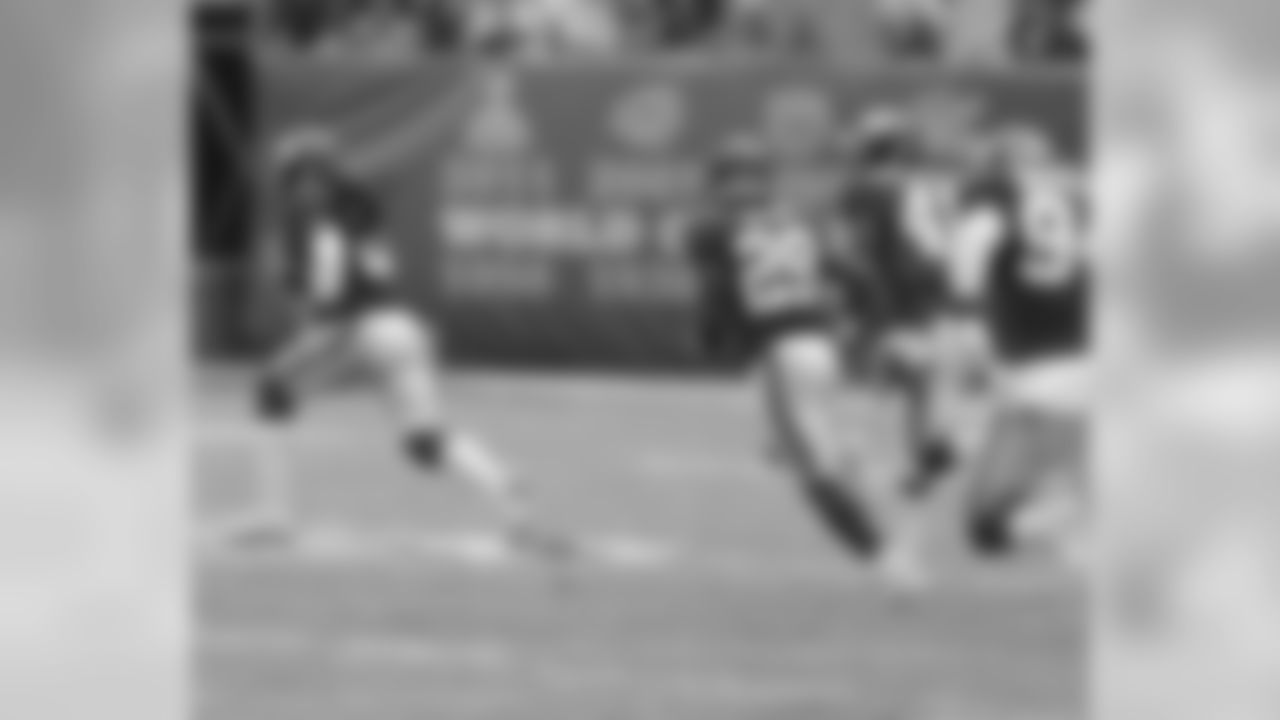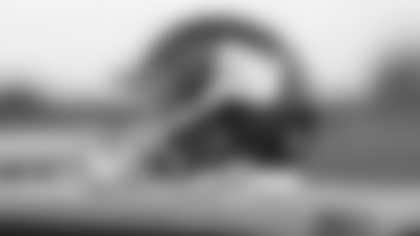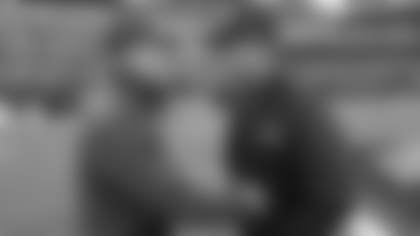The McAdoo Report, Giants.com's exclusive weekly interview with head coach Ben McAdoo:
Q: Half the season remains. Have you developed a routine about when you spend time with the offense, defense and special teams when you're game-planning, etc.? Do you like the components that goes into being a head coach?
|
|||||||||||||||||||
McAdoo: "Yes. I love normal, consistent, seven-day weeks where you play at home on Sunday. Those are the best. In front of the home fans, those are the best weeks. Other than that, there's a lot of adjusting and improvising in this league. You have short weeks, long weeks, bye weeks, night games. You have to be able to adjust and improvise along the way. I think we have all the kinks worked out in the schedule. We like to change the schedule. We're through eight games, then you change it a little bit on Wednesdays. You give them REM Wednesdays. Then, the last four weeks or so, five weeks after Thanksgiving, we'll incorporate REM Thursdays to give them even more rest, so we can ascend through the last quarter of the season."
Q: Do the REM's involve more than letting them sleep and arrive later?
McAdoo: "The meetings are adjusted, the practices are slightly adjusted and you give them extra sleep."
Q: For someone who has spent his career on the offensive side of the ball, how do you like getting a taste of defense and special teams?
McAdoo: "It's just three-fold now. There's a lot more on your plate. I enjoy it. I enjoy having my hands on the whole team and being a part of all three phases."
Q: Do you introduce the opponent to the team on Tuesday?
McAdoo: "Yes. Our schedule is such that we like to get a jump start on the opponent on Tuesdays. That's part of the benefit of the players' days off on Monday. When they come in on Tuesday, you correct and address the last game, then get a chance to get a jump start on the next opponent on Tuesday."
Q: You address the players every day. Do you set time aside every day to get your thoughts together about exactly what you want to say to the players each time you stand in front of them?
McAdoo: "That's a 24/7 process. That never ends. You're always thinking about messaging. Whether it's something that's happening with the schedule, something that's happening within the league, or something that's happening outside the building and the league in society. You're always thinking about how you want to choose your language with the players."
Q: You've been asked a lot about the rushing attack (which is ranked last in the league). The 2011 Giants were last in the NFL in rushing and won the Super Bowl. You keep talking about improving the rushing attack, but is it possible that this is who you are? You're going to win games without rushing the ball for a lot of yards and possessing it for a long time?
McAdoo: "We need to find a way to get better each week. (Walks over to a plaque on his bookcase and reads), 'The better we get at getting better, the faster we will get better.' That's what we need to focus on each and every week. Get better at getting better, find a way to get a win and move on week to week. Nothing is where we want it to be yet. Nothing. We feel that we can get better at everything we're doing, even the things we're doing at a high level. To me, that's where you're focused. The biggest word is 'yet.' We're not where we want to be yet. We just have to keep working."
Q: Last week, you faced a third-and-four late in the game. You called a pass. Eli Manning's throw was tipped at the line and intercepted. A lot of head coaches might have been conservative and run the ball and not take a chance at a turnover. Play callers like to be aggressive and you went for it. Does Ben McAdoo, the head coach, ever disagree with Ben McAdoo, the play caller?
Keep an eye on these five players as the Giants face the Bengals on Monday

CB JANORIS JENKINSThe veteran cornerback's next challenge is Bengals wide receiver A.J. Green, who leads the NFL with 112 receiving yards per game. The competition between the two goes all the way back to their college days in the SEC when Jenkins played at Florida and Green at Georgia.

LB KEENAN ROBINSONSince signing with the Giants this offseason, Robinson has quietly become a force on the defense. He is third on the team in tackles (68) and has five passes defensed, the most among Giants linebackers.

SAFETY LANDON COLLINSCollins, who is the only player in the NFL currently leading his team in tackles (69), sacks (three) and interceptions (three), this week became the first safety to win player of the week awards in consecutive games since Pittsburgh's Troy Polamalu in 2010.

RB PAUL PERKINSThe rookie running back saw his touches increase after the bye week, as he split carries evenly with veteran Rashad Jennings against the Eagles. The fifth-round draft choice from UCLA also had three receptions out of the backfield.

OL BRETT JONESAfter left guard Justin Pugh went down with a sprained knee last week, Jones came in and played 50 snaps, the most he's had since the 2014 Grey Cup when he played for the CFL's Calgary Stampeders. Now the Canadian will be going up against the likes of Cincinnati's perennial Pro Bowler Geno Atkins.
McAdoo: "No. I believe in being aggressive. It's how I grew up in the game. I love the way Spags (defensive coordinator Steve Spagnuolo) called the defense at the end of the game in the sudden change (by blitzing rookie quarterback Carson Wentz after the interception). Aggressive pressure. Went after him. I believe you play offense the same way. We're never going to sit on the ball. We have an opportunity to win the game on third-and-four. With the franchise quarterback that we have and the players we have on offense, we're going to go win the game. We had a couple of opportunities there for a first down. The ball was tipped at the perfect time. Connor Barwin made a heck of a play. Got his hand up at just the right time and tipped the ball. Have to give them credit. We're not going to take five seconds off the clock (on a run) and hope we get a first down on a low percentage call, punt and give them 1:42 or whatever on the clock. We're going to be aggressive and want to win the game right there. Yes, there is internal conflict at times. There is internal conflict at times, but not in that situation."
Q: So your play calling self has to have a discussion with your head coaching self at times?
McAdoo: "At times."
Q: In general, is the red zone a good place to be aggressive on defense?
McAdoo: "I think each and every situation is different and each and every opponent is different. You have to know who you are and what you do best. I just love when the game is on the line, playing aggressive."
Q: There's been a lot of talk and questions this week about young players, many of whom are contributing significantly. What is your philosophy about bringing along the young players?
McAdoo: "Like I said earlier in the year, teaching, coaching, parenting and leading are all kind of wrapped up into one. When you get your hands on young players, the better you do in all those four roles and bring guys along early, give them a taste early of what it's like to play in these games, the more success that they'll have. Not to say that they won't have failures, but they'll get a chance to learn from those failures when the pressure may not be as high or impactful as it is in January, December or February. They'll have a chance to get some of those mistakes, those young player mistakes, out of the way early on."
Q: Is this the time, with half of the season to go, that you would expect them to start making contributions like this?
McAdoo: "I think they're all different. It depends on who they are. Each of the players is different. Some will ascend a little quicker than others. That's why we call it development. They all have different stages that they go through."
Q: One guy that's made a couple of plays is Roger Lewis. You had a lot of receivers in training camp that seemed to be bunched together. Did Lewis stand out to you early?
McAdoo: "He was a guy that we thought highly of through the scouting process. We knew he was going to have a lot to learn coming from the type of (spread) offense that he came from. He really works hard at learning and works hard on the practice field. If you work hard in the meeting room, on the practice field and you have the nice skillset that he has, it's nice to see a guy that works out the way he works and the success as early as he's having it."
Q: You play Monday night against the Bengals, who have one of the NFL's best wide receivers in A.J. Green. How difficult is it to cover a player that can really produce at all three levels?
McAdoo: "The tough part about him, obviously, he has speed. His length is very hard to defend. He has a big catch radius. Even if he's covered, he still has a chance to come up with the ball. When they place the ball high and wide, it's easy for him to come up and make the catch in the red zone. To make those high back catches at the face mask or above. A lot of times, it seems that DB's are just short when they try to tip the ball away or knock the ball away from him just because of that length. (Quarterback) Andy (Dalton) has a good feel on where to place it."
Q: With (tight end) Tyler Eifert back, they have a lot of weapons.
McAdoo: "They have elite skill players. They have four of them. Both backs (Jeremy Hill and Giovanni Bernard), the tight end and A.J. They do a good job of getting them the ball. They're creative with it. They force you to prepare for a lot of things that way. At the end of the day, they do a tremendous job getting the ball in those guys' hands. Letting them do something with it long and short."
Q: Dalton gets somewhat overlooked, but he must be doing something right. And he has an excellent road record.
McAdoo: "No one talks about the quarterback. The thing is he does a great job of protecting the ball. He can place the ball where he wants to, he's accurate, he runs the offense really well. We had a chance to practice against him last year (n Cincinnati before the first preseason game). Developed a lot of respect for him that week. Down there, I didn't get to see him much because we were on the other field going against the defense. Going back and looking at some of the things they did in practice that week, he had a nice week. Runs the offense at a high level. Gets it to his playmakers and is very accurate."
Q: Their defensive ends are like NBA players. They're all 6-foot-6 or bigger. They've batted down 13 passes this season. Does Eli have to be cognizant that they're going to get their hands up?
McAdoo: "Absolutely. We have a plan for that this week in practice. We're working it out there in our seven-on-seven drills. Also, the offensive line has responsibility there as well. They have to get their hands down and keep them down."
Q: In general, they have a strong front. Carlos Dunlop was fourth in the league last year with 13.5 sacks.
McAdoo: "We saw some of him last year. He may have been nicked up a little bit early on in the preseason. They can get pressure on the quarterback with the front four. They do have a nice pressure package. They do a good job of taking you out by chipping the defensive ends with the multiple looks they give you. That front four is long. They don't necessarily have to be rushing to disrupt the quarterback. They can push the pocket a little bit. Get their hands up. (Tackle) Geno (Atkins) is a guy that's like the Tasmanian Devil in there. He has a quick first step. He can stick and move in there, be disruptive."






